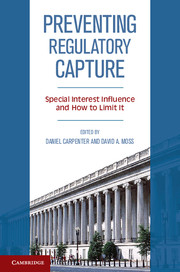Book contents
- Frontmatter
- Contents
- List of Figures
- List of Tables
- Editors
- Contributors
- Preface
- Acknowledgments
- Introduction
- Section I Failures of Capture Scholarship
- Section II New Conceptions of Capture – Mechanisms and Outcomes
- 4 Cultural Capture and the Financial Crisis
- 5 Complexity, Capacity, and Capture
- 6 Preventing Economists’ Capture
- 7 Corrosive Capture? The Dueling Forces of Autonomy and Industry Influence in FDA Pharmaceutical Regulation
- Section III Regulatory Case Studies
- Section IV The Possibility of Preventing Capture
- Conclusion
- Afterword
- Index
- References
5 - Complexity, Capacity, and Capture
Published online by Cambridge University Press: 05 June 2014
- Frontmatter
- Contents
- List of Figures
- List of Tables
- Editors
- Contributors
- Preface
- Acknowledgments
- Introduction
- Section I Failures of Capture Scholarship
- Section II New Conceptions of Capture – Mechanisms and Outcomes
- 4 Cultural Capture and the Financial Crisis
- 5 Complexity, Capacity, and Capture
- 6 Preventing Economists’ Capture
- 7 Corrosive Capture? The Dueling Forces of Autonomy and Industry Influence in FDA Pharmaceutical Regulation
- Section III Regulatory Case Studies
- Section IV The Possibility of Preventing Capture
- Conclusion
- Afterword
- Index
- References
Summary
INTRODUCTION
In the debates on financial market reform that followed the Financial Crisis of 2007 and the Great Recession, reformers advocated three distinct approaches. Some argued that governments should act to fundamentally restructure the financial sector. Large banks should be broken up. Investment and commercial banks should be separated as they had been under the Glass-Steagall reforms of the 1930s (or at least the investment activity of commercial banks should be drastically restricted). Limits on the types of financial products that could be marketed and taxes on financial transactions were promoted. Opponents of government intervention positioned themselves at the opposite position. They argued that a government-led reconstruction of the financial marketplace would be counterproductive, if not futile. Such actions would impede financial innovation and restrict credit and liquidity. At most, according to this view, reform should get the taxpayer off the hook for the failure of financial firms. The middle ground in this debate was held by those who argued that the basic structure of the financial sector should remain intact but that the capacity and powers of regulatory agencies should be enhanced to better monitor the sector for systemic risks, financial fraud, and predatory lending practices. The middle ground, reflected in the Dodd-Frank financial reform bill, appears to have won out.
Information
- Type
- Chapter
- Information
- Preventing Regulatory CaptureSpecial Interest Influence and How to Limit it, pp. 99 - 123Publisher: Cambridge University PressPrint publication year: 2013
References
Accessibility standard: Unknown
Why this information is here
This section outlines the accessibility features of this content - including support for screen readers, full keyboard navigation and high-contrast display options. This may not be relevant for you.Accessibility Information
- 16
- Cited by
